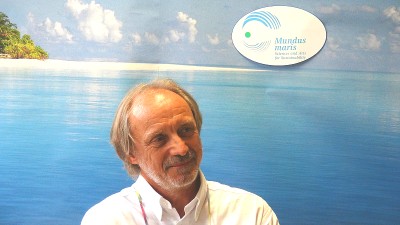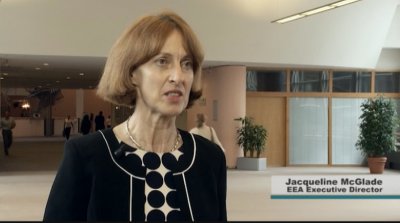
Scientists
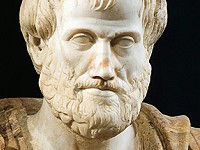 Scientists study the oceans in different ways from artists, but may be as passionate about the seas. Curiosity and practical needs have induced study of the seas and their creatures since antiquity.
Scientists study the oceans in different ways from artists, but may be as passionate about the seas. Curiosity and practical needs have induced study of the seas and their creatures since antiquity.
More recently, as a result of a public invitation on facebook to suggest questions, we've been asking several scientists what they consider the greatest threats to the oceans and what they suggest to do about them.
The resulting video interviews, TED talks of leading scientists fascinated by the oceans and more are here for you to discover.
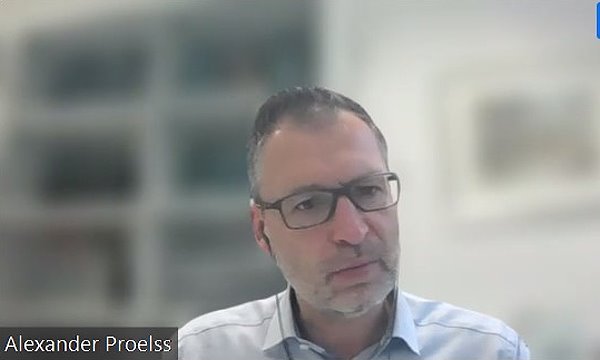 Prof. Alexander Proelss is Chair of International Law of the Sea and International Environmental Law, Public International Law and Public Law, at the University of Hamburg, Germany. His research focuses, among aspects of general international and European Union law, on the international Law of the Sea, international environmental law as well as international aspects of German constitutional law. Prof. Proelss is involved in several legal and interdisciplinary research projects and has advised public agencies, international organisations, private companies and NGOs.
Prof. Alexander Proelss is Chair of International Law of the Sea and International Environmental Law, Public International Law and Public Law, at the University of Hamburg, Germany. His research focuses, among aspects of general international and European Union law, on the international Law of the Sea, international environmental law as well as international aspects of German constitutional law. Prof. Proelss is involved in several legal and interdisciplinary research projects and has advised public agencies, international organisations, private companies and NGOs.
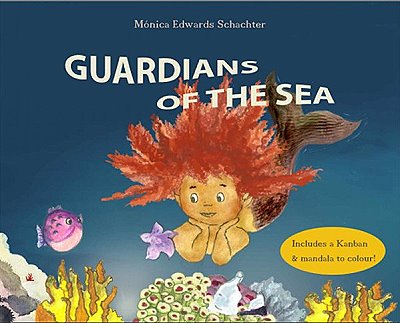 We met Mónica Edwards Schachter years ago at an innovation meeting in Madrid, far from her native Argentina. Through sporadic contacts we kept in touch, each one deeply involved in their respective projects about ocean literacy and protection. The shared enthusiasm for mobilising the sciences and arts together for child and adult education in innovative ways made our roads cross again in the occasion of the launch of her beautiful children's book Guardians of the Sea,
We met Mónica Edwards Schachter years ago at an innovation meeting in Madrid, far from her native Argentina. Through sporadic contacts we kept in touch, each one deeply involved in their respective projects about ocean literacy and protection. The shared enthusiasm for mobilising the sciences and arts together for child and adult education in innovative ways made our roads cross again in the occasion of the launch of her beautiful children's book Guardians of the Sea,
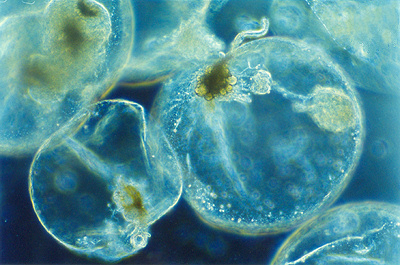 How does plankton affect the weather? How does the biodiversity of these organisms shape our existence? How do the diminishing numbers of diatoms, a type of micro-algae, and the revival of dinoflagellates or archaic cyanobacteria, threaten our health? Why is the severest impact of ocean plastic pollution not even covered by the media? And why is the Iodysseus programme at the heart of the issues faced by the planet’s global ecosystem?
How does plankton affect the weather? How does the biodiversity of these organisms shape our existence? How do the diminishing numbers of diatoms, a type of micro-algae, and the revival of dinoflagellates or archaic cyanobacteria, threaten our health? Why is the severest impact of ocean plastic pollution not even covered by the media? And why is the Iodysseus programme at the heart of the issues faced by the planet’s global ecosystem?
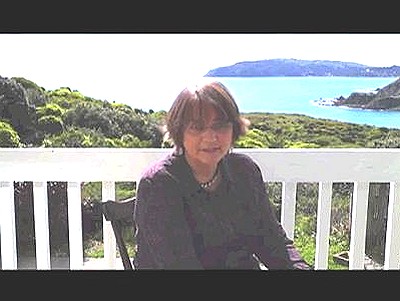 The South Pacific Regional Fisheries Management Organization (SPRFMO) is responsible for a vast area covering almost a quarter of all high seas areas in the world. Dr Johanne Fischer is the Executive Secretary based at its headquarter in Wellington, New Zealand.
The South Pacific Regional Fisheries Management Organization (SPRFMO) is responsible for a vast area covering almost a quarter of all high seas areas in the world. Dr Johanne Fischer is the Executive Secretary based at its headquarter in Wellington, New Zealand.
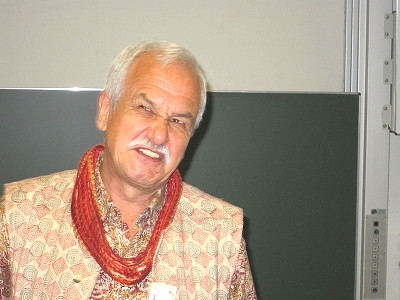 We met Prof. Victor Smetacek at the recent Forum of the German Society for Marine Research (DGM) in Bremen, where he gave one of the impulse talks and seized the opportunity to ask him a few questions on where he sees the future of marine research in the face of global change.
We met Prof. Victor Smetacek at the recent Forum of the German Society for Marine Research (DGM) in Bremen, where he gave one of the impulse talks and seized the opportunity to ask him a few questions on where he sees the future of marine research in the face of global change.
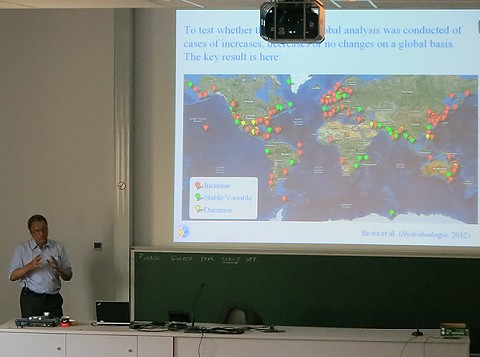 Daniel Pauly is the leading fisheries scientist of our time and one of the most prolific of all times. He is one of the two founding fathers of FishBase the successful web archive about all fish species known to science and a public darling serving more than half a million users month after month.
Daniel Pauly is the leading fisheries scientist of our time and one of the most prolific of all times. He is one of the two founding fathers of FishBase the successful web archive about all fish species known to science and a public darling serving more than half a million users month after month.
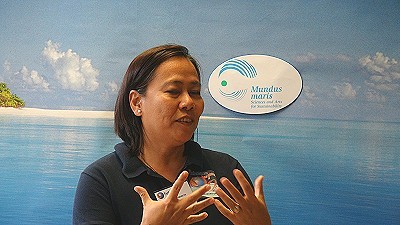 Mundus maris asked their followers on facebook what they wanted to know from scientists, artists and practitioners about the ocean.
Mundus maris asked their followers on facebook what they wanted to know from scientists, artists and practitioners about the ocean.
Dr Froese is one of the fathers of FishBase, the immensely successful free web archive about all species of fish known to science. FishBase serves between one half and one million users every month. He does his research at GEOMAR in Kiel, Germany, and has successfully led several international research collaborations in addition to coordinating his greatest scientific achievement, FishBase.
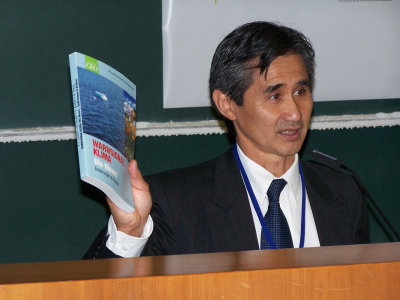 Dr. José Lozán is a long-term guest scientist from Peru working at the University of Hamburg and Co-editor of the GEO Book Series “Warning signs” to popularise science. During his work at the university he has been particularly concerned with making the best science about water, the oceans and our climate available to young people and the public at large.
Dr. José Lozán is a long-term guest scientist from Peru working at the University of Hamburg and Co-editor of the GEO Book Series “Warning signs” to popularise science. During his work at the university he has been particularly concerned with making the best science about water, the oceans and our climate available to young people and the public at large.
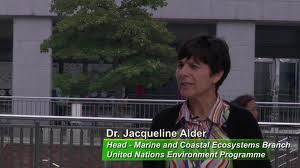 In the occasion of the 10th Conference of the Parties of the Convention on Biological Diversity, held in 2010 in Nagoya, Japan, Dr. Jacqueline Alder, in charge of UNEP's Marine and Coastal Programme, gave an interview about current threats to biodiversity and what these mean particularly to Hawaii.
In the occasion of the 10th Conference of the Parties of the Convention on Biological Diversity, held in 2010 in Nagoya, Japan, Dr. Jacqueline Alder, in charge of UNEP's Marine and Coastal Programme, gave an interview about current threats to biodiversity and what these mean particularly to Hawaii.
Click here for the interview on YouTube.








